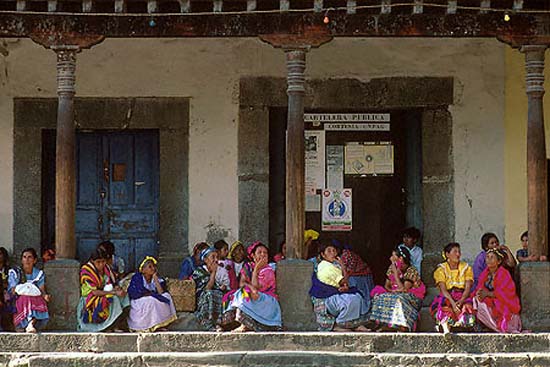
The most intriguing project I've seen involves the construction of a classroom with plastic bottles filled with inorganic trash. The idea was born with an NGO called Pura Vida, or Pure Life, and has been implemented in various places throughout Guatemala. While these projects' structural integrity may sound questionable, I have seen them work. Wood, rebar and concrete are used for the frame, then the bottles are placed between chicken wire, and three layers of cement is spread on both sides of the wall to protect the bottles; the roof is corrugated tin. These "bottle schools," as they are affectionately called, offer the obvious benefit of cleaning up the community. This style of construction is inexpensive and gets community members, from schoolchildren to grandparents, involved in the building process. I believe we will see many more of these projects implemented, cleaning up the environment and saving money that can be used to carry out other projects. While the projects are designed to require little funding, they still do require outside financial support.
Guatemala Peace Corps Volunteer Audrey Squires writes: I began teaching people how to reduce their waste and reuse materials in ways that don't require large projects or outside assistance
GUEST VIEWPOINT: Peace Corps volunteer helps Guatemalans deal with trash
By Audrey Squires
Appeared in print: Wednesday, Nov 4, 2009
Opinion: Editorials & Letters: Story
Growing up on the outskirts of Springfield, I remember sorting tin and aluminum cans before my family hauled our trash and recyclables to the dump in Glenwood. It made so much sense, and it seemed so easy. It was inconceivable to me that there was any other option. Eventually I learned otherwise.
While attending Willamette University, I had a part-time job at a local business where hundreds of pop cans were thrown into the trash daily. I tried to persuade the owner to recycle them. He was sympathetic, but said that it was simply too costly. That was when my interest in working in trash management was piqued. I wondered: If a place exists in Oregon that still doesn't recycle, what's it like in developing countries?
Nearly two years ago I moved to rural Guatemala as an ecotourism volunteer with the Peace Corps. In this capacity, I have been able to take on many secondary projects related to trash management. Here, there are few options for disposal beyond clandestine dumps or trash burning, but not for lack of interest. The shortcomings of the education system and a lack of financial resources inhibit people's ability to keep their local environments clean.
People always ask me what they can do with their trash. Most don't want to throw it on the ground, but they don't know what else they can do with it. So I began teaching people how to reduce their waste and reuse materials in ways that don't require large projects or outside assistance, because the first step is to keep from having to create an infrastructure and use energy to clean up problems that could have been avoided.
However, that in itself is not a fully adequate solution. So I researched low-cost, low-infrastructure projects that could be implemented at the community level. With the help of other Peace Corps volunteers, international nongovernmental organizations and members of the communities where I work and live, I found innovative solutions that not only address waste management, but also other needs.
The most intriguing project I've seen involves the construction of a classroom with plastic bottles filled with inorganic trash. The idea was born with an NGO called Pura Vida, or Pure Life, and has been implemented in various places throughout Guatemala. While these projects' structural integrity may sound questionable, I have seen them work. Wood, rebar and concrete are used for the frame, then the bottles are placed between chicken wire, and three layers of cement is spread on both sides of the wall to protect the bottles; the roof is corrugated tin.
These "bottle schools," as they are affectionately called, offer the obvious benefit of cleaning up the community. This style of construction is inexpensive and gets community members, from schoolchildren to grandparents, involved in the building process. I believe we will see many more of these projects implemented, cleaning up the environment and saving money that can be used to carry out other projects. While the projects are designed to require little funding, they still do require outside financial support.
A community near where I live is on a mountainside, so before we can begin thinking about building classrooms, a containing wall is needed. The only materials we will use are used tires and dirt. The tires will be filled with dirt and stacked to build the wall. The community has begun collecting the 500 tires that are needed for the wall, which means hundreds of tires will not be burned or thrown into rivers.
In Agua Caliente, a tourist destination, the villagers said their trash problem is a threat to their livelihood. I am helping the village build a small sanitary landfill and start an environmental education program. Currently, there are only two sanitary landfills in Guatemala.
All of these projects are small-scale and community-based. Though their direct impact may be small and localized, my hope is that their indirect impact will be large and broad. These three villages will become models, not only because of their innovative projects but for their levels of community participation.
In the Peace Corps, we focus on capacity-building. The leaders of these communities will be able to host other communities in the region and teach them how to implement similar projects.
I hope that when I finish my two years of service next March and head home to Springfield, I will be leaving behind a good start toward improving trash management in my adopted Guatemalan community.
Audrey Squires, a Springfield native and graduate of Willamette University, can be reached at audrey.squires@yahoo.com, or followed at http://audreysquires.blogspot.com.












